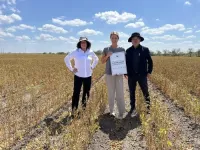(Press-News.org) Review in The Lancet finds that one in five globally are at risk of contracting cardiovascular diseases, because they carry a genetic risk of high levels of a specific lipoprotein, which can be tested for and possibly treated.
20 % of the world population carries a genetic risk factor for cardiovascular diseases such as heart attacks, strokes, and aortic valve stenosis: Increased levels of a lipid particle called lipoprotein(a). It is the most common genetic cause of cardiovascular diseases.
“Lipoprotein(a) is the direct cause of cardiovascular diseases much like cigarettes cause lung cancer. Yet most people that carry an increased amount of lipoprotein(a) are unaware. With new medication under way that lowers the amount of the lipid particle significantly, it is high time we identify individuals who would benefit from it,” says first author Professor Børge Nordestgaard, Clinical Professor at University of Copenhagen and Chief Physician at Copenhagen University Hospital - Herlev-Gentofte Hospital, who wrote a comprehensive ABC on lipoprotein(a) in cardiovascular disease, just published in The Lancet.
The technology used for testing for lipoprotein(a) is readily available and easy to use, so while the clinical trials are under way, it makes sense to expand testing globally, says Børge Nordestgaard:
“By expanding testing, we can figure out who carries it and would benefit from lipoprotein(a)-lowering medication. And until the medication becomes available, we can use this knowledge to take better care of individuals with high concentrations of lipoprotein(a) in their blood. The main factors here are making sure to exercise, eating healthy, avoiding smoking and being overweight, and treating high cholesterol levels.”
Five drugs are currently in development that can lower the amount of lipoprotein(a) by 65 to 98 %, three of which are in phase 3 clinical trials. Some of the new medication under development is so-called gene silencing therapy.
“The medication is injected and then absorbed by the liver cells, inhibiting the production of the lipoprotein(a) and significantly reducing the amount of the lipid particles in the blood and presumably the risk of contracting cardiovascular diseases,” says Børge Nordestgaard.
The first results showing that a reduction of lipoprotein(a) will reduce cardiovascular diseases are expected to be published in 2026.
Read the review “Lipoprotein(a) and cardiovascular disease” in The Lancet: https://www.thelancet.com/journals/lancet/article/PIIS0140-6736(24)01308-4/fulltext
END
Increased testing for heart disease indicator needed worldwide
2024-09-12
ELSE PRESS RELEASES FROM THIS DATE:
Huge gamma-ray burst collection 'rivals 250-year-old Messier catalogue'
2024-09-12
Huge gamma-ray burst collection 'rivals 250-year-old Messier catalogue'
Royal Astronomical Society press release
RAS PR 24/24
Embargoed until 00:01 BST on Friday 13 September 2024
Hundreds of gamma-ray bursts (GRBs) have been recorded as part of an enormous global effort so extensive it "rivals the catalogue of deep-sky objects created by Messier 250 years ago", astronomers say.
GRBs are the most violent explosions in the Universe, releasing more energy than the Sun would in 10 billion years. They occur when either a massive star dies or two neutron stars merge.
The explosions are so ...
Crude oil decimates sea otter buoyancy
2024-09-12
Sea otters are famed for their luscious pelts, but the fur almost led to their extinction. By 1938, only a tiny population of ~50 remained clinging to the central California coast. Since then, the mammals have battled back; however, the charismatic creatures are still at risk from crude oil spilled by offshore rigs. But no one knew how severely crude oil impacts the buoyancy of sea otter fur or how well it recovers after cleaning. And Kate Riordan from California Polytechnic State University San Luis ...
Semaglutide and tirzepatide lead to better blood sugar control and weight loss in individuals with type 1 diabetes, US study finds
2024-09-12
Semaglutide and tirzepatide treatment lead to significant weight loss and improve blood sugar control in individuals with type 1 diabetes (T1D) who are living with overweight or obesity, new research being presented at the annual meeting of the European Association for the Study of Diabetes (EASD) in Madrid, Spain (9-13 September) has found.
The two relatively new drugs are approved to treat type 2 diabetes and for weight loss. In type 2 diabetes, they help the body produce more insulin when needed. ...
Fear of hypoglycaemia remains a major barrier to exercise among adults with type 1 diabetes
2024-09-12
Despite high use of continuous glucose monitoring and insulin pump therapy, fear of hypoglycaemia (low blood sugar) remains a significant barrier to physical activity and exercise for adults with type 1 diabetes (T1D), according to new research to be presented at this year’s Annual Meeting of The European Association for the Study of Diabetes (EASD), Madrid (9-13 Sept).
However, the findings suggest that if exercise and diabetes management are discussed in the clinic, this fear could be reduced.
“Regular exercise can help individuals with diabetes to achieve their blood glucose goals, improve their ...
New technology ‘game changing’ for marathon runners with type 1 diabetes
2024-09-12
A series of case reports to be presented at this year’s Annual Meeting of The European Association for the Study of Diabetes (EASD), Madrid (9-13 Sept), describe how a technology giving insulin doses informed by an insulin pump algorithm helped three adults with type 1 diabetes better manage their blood sugars enabling them to lead more active lives, and even run marathons.
The AID system contains an advanced hybrid closed loop algorithm that automates the delivery of both basal and correction bolus insulin every 5 minutes based on sensor glucose values.
“It is great to see advances in ...
Vitis vinifera and muscadines: Grape breeders seek the best of both grapes
2024-09-12
By John Lovett
Arkansas Agricultural Experiment Station
FAYETTEVILLE, Ark. — Muscadines may be the folksy American of the grape world, but they have many qualities like disease resistance and unique flavors that are desired in the more popular Vitis vinifera (bunch grapes) species.
Likewise, Vitis vinifera — the species that most people eat as table grapes and drink in wine — has many characteristics desirable for muscadines, like thinner skin, a crispier texture and seedlessness. Successfully combining traits from these two species of grapes is a challenge due to differing numbers ...
A new tack for slack: motivate workers
2024-09-12
Workplace communications platforms such as Slack and Microsoft Teams are sometimes accused of reducing productivity by distracting workers with constant messages and the need to respond to them.
But new research by Wen Wen, associate professor of information, risk, and operations management (IROM) at Texas McCombs, shows that companies can use them to do the opposite: to motivate workers.
How? By praising successful employees in all-staff channels that everyone can see — especially when they can’t see one another face-to-face.
“One important challenge faced by many companies is how to motivate remote workers and keep them productive,” ...
UTA harvests first climate-smart soybean crop
2024-09-12
UT Arlington biologists, working with underserved farmers in South Texas, have harvested their first crop of climate-smart soybeans. This harvest is part of a four-and-a-half-year, $5 million project funded by the U.S. Department of Agriculture (USDA) to test whether climate-smart agricultural practices can reduce emissions of greenhouse gases (GHGs) responsible for climate change—including carbon dioxide, methane, and nitrous oxide—while simultaneously increasing crop production.
“We ...
JGU hosts annual meeting of the ATLAS Collaborative Research Center
2024-09-12
The connections between particles and their mass, the composition of the universe out of matter and antimatter and the search for previously unknown particles such as the so-called “dark matter” are the focus of researchers at the research center CERN in Geneva, which is celebrating its 70th birthday this year with events all around the world. In four large-scale experiments, scientists at the Large Hadron Collider (LHC) are getting to the bottom of the secrets of the universe. This particle accelerator offers researchers ...
Med school scientist receives prestigious NSF award for inflammation research
2024-09-12
Associate Professor Justine Tigno-Aranjuez will use a five-year grant of more than $1 million to study how influences on the production of lipid mediators to better understand impacts on inflammation.
A College of Medicine researcher has received a prestigious U.S. National Science Foundation CAREER Award to support her research into the cellular causes of inflammation, discoveries that could be pivotal for treating conditions like Crohn’s disease and arthritis.
Justine Tigno-Aranjuez’s lab has been researching lipid mediators — ...



